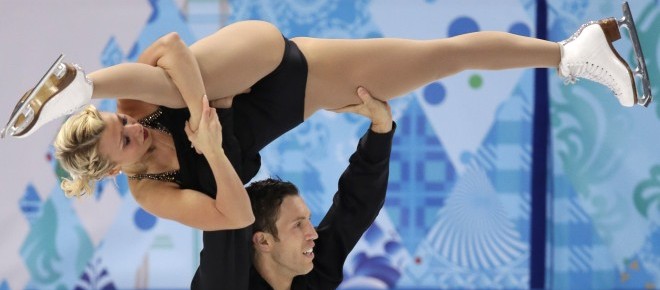A tale of two finishes
Canadian pairs end up 5th and 7th in Figure Skating, but have very different reactions.
Dylan Moscovitch and Kirsten Moore-Towers (Bernat Armangue/AP)
Share

Eight feet up in the air, at the end of Dylan Moscovitch’s extended arms, Kirsten Moore-Towers couldn’t stop herself from giggling. They were nearing the end of their long program in their first Olympics, and her joy was irrepressible.
“I wear my heart on my sleeve. You can tell when I’m upset and when I’m happy,” she said. “There’s no hiding it.”
On a night dominated by the hosts—Tatiana Volosozhar and Maxim Trankov took the gold, and Vera Bazarova and Yuri Lariionov, the silver for Russia—the Canadian pair finished in fifth. But it was up one spot from their ranking after the short program, and the heady experience is already fueling dreams of Pyeongchang.
Or as the diminutive Moore-Towers shouted out when asked about their future, “2018? Hell, ya!”
Heading home with a silver medal from the team event—it’s “heavy as a dumbell” said Moscovitch—they declared themselves thoroughly satisfied with the experience, which included a Skype call from the press zone to supporters at their home rink back in Waterloo, Ont.
“We really took our Olympic moment and we’re going to feel it for the rest of our lives,” said Moore-Towers.
It was a far different vibe from the frowns and tears displayed by Meagan Duhamel and Eric Radford after their free skate. Coming into the night ranked fifth, the delivered a sub-par performance with a couple of stumbles and a fall, and finished in seventh place overall.
“I think we know what our potential is, and our potential is a lot higher,” said Radford. Indeed, the pairing, also participating in their first Olympics, had finished third at least year’s World Championship, and are fourth in the ISU ranking this season.
“We see athletes in all sports, here at the Olympics, not qualifying for finals—great athletes,” said Duhamel. “That’s the story of the Games. There’s triumph and there’s heartbreak.”
Regardless, the way the evening unfolded, the chances of either Canadian couple hitting the podium were slim. Jian Tong and Pang Quin of China, moved from fourth to the bronze medal, but only because Aliona Savchenko and Robin Szolkwoy of Germany, ranked second in the world, absolutely pooched their program. And the Germans still finished five points ahead of Moore-Towers and Moscovitch.
Canada’s third pair, Paige Lawrence and Rudi Swiegers, came 14th after a shaky free skate, but said they were simply happy to have been in Sochi. “Every time we have stepped on to that ice I had so much fun,” said the bubbly Lawrence. “I didn’t want to get off. I just kept curtseying. If I could have, I would have curtseyed to every single person.”
“Being able to have those Olympic rings underneath you when you start and finish the program is surreal,” Swiegers added. “We’ve been dreaming about this…forever.”
Lawrence’s hometown of Kennedy, Saskatchewan, population 187, has a tradition of staging a potluck to welcome home its Olympians. (Colleen Sostorics, who won three gold medals with Canada’s women’s hockey team, also hails from there.) Someone usually cooks a turkey, said Lawrence, and they’ll be lasagna, and some yummy salads. Swiegers, who now lives just across the Manitoba border in Virden, Manitoba, nodded his head in agreement. “And, I’d like to put in an order for some chicken dumplings,” he said.